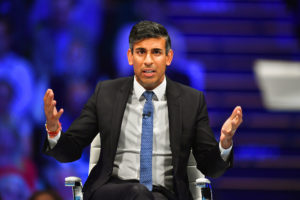After the drama and dethronement of 2022, the Conservative Party has now entered its Phoney War. No one, it seems, has the strength or intention to move against Rishi Sunak, but they are jostling to be best positioned — ideologically and politically — for when the ball comes loose.
Unfortunately for the Prime Minister, this makes it even harder to establish his programme for government. Sunak’s place as leader is weak in an unprecedented way. Not only are there three former prime ministers on his backbenches, but two of them, (Truss and Johnson) never had their falling popularity confirmed by a bad election. This makes them, and their ideas, more potent than any former leader roundly ousted by the public. Moreover, neither seems willing to slide quietly into the obscurity of the speaking circuit.
Truss sees herself as the party’s Cassandra. She thinks her prophecies of the need for deregulation and growth were right, but wrongly ignored. She has a group of supporters who think the chaos of implementation should not hamper the salience of her suggestions. The so-called “ginger group” are trying to seize the intellectual levers of the party, ready for another go at the top, and want to chart a course of economic liberalism, deregulation and growth.
On Sunak’s other flank sit the continuity-Johnsonites. What they believe is a little hard to ascertain. Boris made his way through the party by promising every faction he was, deep down, one of them. He was, oddly enough, like the errant husband who tells his wife he is staying and his mistress he is divorcing for her — with both believing the other is the fool. The Johnsonites show little intellectual purity but are bound in personal loyalty to their man. A few dozen are even plotting his return.
For them, only Boris can arrest the party’s polling nosedive; only Boris can hold onto the Red Wall and the Tory seats of the south-east. The fall in polling in the first half of 2022 is ignored, and so, too, the by-election defeats that triggered the vote of confidence in the then PM, or even the contradictory threat that Johnson, the one-man electoral magic, will give up his challenge to Sunak if he’s allowed to chicken-run to a safer seat than his current Uxbridge. It’s more about faith than facts.
Taken together, these tribes present a problem for Sunak, but not a fatal one. Both his predecessors were popular with the membership and both have a parliamentary faction that is big enough to disrupt but not destroy his premiership. In any case, it’s unclear if either has the appetite to bring him down: Truss blew her shot and lacks an obvious successor, and Johnson pulled up at the first fence of the recent leadership contest. What they can do is snipe and plot.
Tory leaders have always faced grumbling. Heath was barracked by the Right-wing Monday Club and the development of the economically liberal faction that would become the Thatcherites. A decade later, Mrs Thatcher had to face down her Wets, whose spiritual leader became the ageing Earl of Stockton, Harold Macmillan, who fired softly-spoken broadsides against her embrace of “the Manchester School” and rejection of old Tory patrician ideals. Yet in these eras, there was sufficient deference to the leader, and the prime minister had sufficient strength, to lead an alternative narrative. Sunak seems to lack this.
Where Boris could be a chimaera that every faction could see themselves in, Sunak is the opposite. He is a Brexiteer, a true, pre-2016 believer, who has the air of Remain about him. He’s an MBA touting hedge-fundie and Goldman Sachs man who is attacked as a socialist. He was Boris’ side-kick in the Treasury for the high-spending, minimum wage boosting, pre-Covid budget, yet is seen as an austerity-monger. His Covid spending was hugely popular inside and outside the party at the time, but now no one seems to praise him for it. Even his popularity in parliament seems to be by default rather than dedication. He has ascended to the top of politics despite an incongruent lack of political appeal.
The steady managerialism which won him the job makes it hard to pull together a narrative. Boris won the party over with his showmanship, Truss courted the members with a steely determination to implement her beliefs. Both largely fell for the same reasons. With Sunak, everything seems neatly totted up, but it’s a whole that is lesser than the sum of its parts. There is nothing irresistible about his leadership — and so you can see how it will be resisted. Probably not directly, but he will have to work hard for the party to steer his programme through the Commons with these factions in play.
He’ll probably get the chance to do this. The rabble-rousers will make the water choppy, but not prevent him from steering through it. Their minds are on what comes after. The smarter, less party-line-taking MPs are accepting that the game is up and opposition beckons. They know this will be followed by a leadership election and a period of party soul-searching, so they are getting their ideas formed early. Both the Trussketeers and the Johnsonians seem to have this period as their real target.
The problem is that the triumph of ideas in the next term might simply be decided by the rate of decline in the Tories in this one. Few on the Right seem to understand how catastrophic the next election could be. On current polling trends, the party could be reduced to fewer than 150 MPs. While such a rout instinctively feels impossible, so too did the collapse of the Lib Dems and Scottish Labour in 2015 — even when all the data pointed to it.
Just because something is unprecedented does not mean it is impossible. Mid-term polling tends to narrow as governments approach general elections, but it is not an automatic process. With the economic outlook for this year looking gloomy, industrial relations worsening, and another bad winter for the NHS between now and polling day, there’s as much chance of a Tory rout as a revival.
Should this come, it adds an interesting gloss to all this infighting and positioning. The next leadership election will be largely decided by the Tories in Parliament after the next polling day. If a wipe-out hits, that caucus looks very different. Many of the frontbench could be gone, Truss’ protégé Simon Clarke could be handed his electoral P45, and even Boris could be kicked out without a new seat. Even if they spend the next 18 months floating ideas and launching papers, the new direction of the Tory Party will largely be decided by who is left clinging to the wreckage when the electoral tsunami has swept through.
At that point, the factions will seek to differentiate themselves from Sunak’s programme. Whether it is continuity Truss or the Johnsonian cabal, they are likely to be noisy. Other factions will also emerge — Priti Patel is reportedly working with the members, and is allied with the new Conservative Democracy Organisation that seeks to empower them.
There are two ways of looking at the current turbulence. Either discipline is collapsing into fractiousness, or the party is genuinely trying to figure out its next direction. Some MPs will be pure of heart, others entirely self-centred. Many will be in the middle, anxiously looking at their constituency prospects. For Sunak the motives matter little. His agenda will be disrupted by each flexing their brains and their numbers in parliamentary rebellions, even if his premiership endures.
It’s arguable that the Tory Party malaise has its ultimate roots in the failure to find a footing after 1997. It groped around for ideas until the financial crisis gave it the opportunity to return to government. The party’s most distinct theme for that era, its euroscepticism, was something leaders largely tolerated rather than embraced. The result was a party which seemed to stand for little beyond winning elections. There is a risk that soon it won’t even have that.
This does all point to a broader problem for the Right. The Conservative Party has maintained conservatism in one form or another for two centuries. If it is not able to put together a convincing and coherent platform that is both principled and popular, it is unlikely anyone else will be able to do it. When both the affluent and the left-behind feel comfortable voting Labour, it becomes questionable whether conservatism itself can survive.
Disclaimer
Some of the posts we share are controversial and we do not necessarily agree with them in the whole extend. Sometimes we agree with the content or part of it but we do not agree with the narration or language. Nevertheless we find them somehow interesting, valuable and/or informative or we share them, because we strongly believe in freedom of speech, free press and journalism. We strongly encourage you to have a critical approach to all the content, do your own research and analysis to build your own opinion.
We would be glad to have your feedback.
Source: UnHerd Read the original article here: https://unherd.com/




